It's Gayle King's Job to Ask Questions
Latest

Gayle King, a woman widely praised for her composure and interview skills during her March 2019 interview with R. Kelly, has faced heavy criticism this week over an interview with WNBA legend Lisa Leslie. In a clip posted by CBS, King asked Leslie her thoughts on the “complicated” legacy of her late friend Kobe Bryant, who was accused of sexual assault in the early 2000s. Leslie responded in defense of her friend and expressed her wish that the media would be more “respectful” of Bryant’s memory during this time, before discussing the impact of his death.
It is, from start to finish, a standard morning show interview with a sense of heart and an equally standard journalistic curiosity. Yet Gayle King, a woman merely doing her job, saw the aggressive criticism on social media—including from Snoop and, later, Bill Cosby tweeting from jail—and felt compelled to apologize for asking the exact questions that many of her viewers are grappling with.
-

-

-

-

-

-

-

-

-

-

-

-

-

-

-

-

-

-

-

-

-

-

-

-

-

-

-

-

-

-

-

-

-

-

-

-

-

-

-

-








































